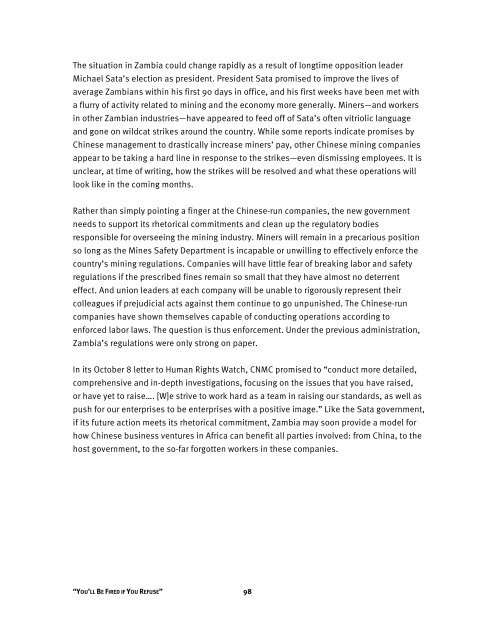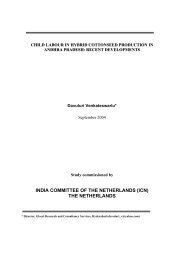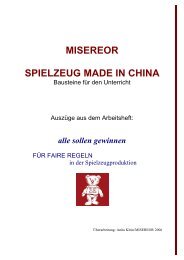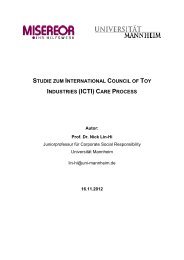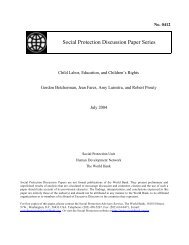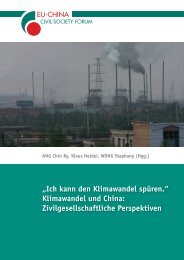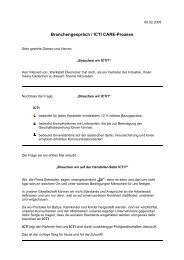“You'll Be Fired if You Refuse†- Human Rights Watch
“You'll Be Fired if You Refuse†- Human Rights Watch
“You'll Be Fired if You Refuse†- Human Rights Watch
You also want an ePaper? Increase the reach of your titles
YUMPU automatically turns print PDFs into web optimized ePapers that Google loves.
The situation in Zambia could change rapidly as a result of longtime opposition leader<br />
Michael Sata’s election as president. President Sata promised to improve the lives of<br />
average Zambians within his first 90 days in office, and his first weeks have been met with<br />
a flurry of activity related to mining and the economy more generally. Miners—and workers<br />
in other Zambian industries—have appeared to feed off of Sata’s often vitriolic language<br />
and gone on wildcat strikes around the country. While some reports indicate promises by<br />
Chinese management to drastically increase miners’ pay, other Chinese mining companies<br />
appear to be taking a hard line in response to the strikes—even dismissing employees. It is<br />
unclear, at time of writing, how the strikes will be resolved and what these operations will<br />
look like in the coming months.<br />
Rather than simply pointing a finger at the Chinese-run companies, the new government<br />
needs to support its rhetorical commitments and clean up the regulatory bodies<br />
responsible for overseeing the mining industry. Miners will remain in a precarious position<br />
so long as the Mines Safety Department is incapable or unwilling to effectively enforce the<br />
country’s mining regulations. Companies will have little fear of breaking labor and safety<br />
regulations <strong>if</strong> the prescribed fines remain so small that they have almost no deterrent<br />
effect. And union leaders at each company will be unable to rigorously represent their<br />
colleagues <strong>if</strong> prejudicial acts against them continue to go unpunished. The Chinese-run<br />
companies have shown themselves capable of conducting operations according to<br />
enforced labor laws. The question is thus enforcement. Under the previous administration,<br />
Zambia’s regulations were only strong on paper.<br />
In its October 8 letter to <strong>Human</strong> <strong>Rights</strong> <strong>Watch</strong>, CNMC promised to “conduct more detailed,<br />
comprehensive and in-depth investigations, focusing on the issues that you have raised,<br />
or have yet to raise…. [W]e strive to work hard as a team in raising our standards, as well as<br />
push for our enterprises to be enterprises with a positive image.” Like the Sata government,<br />
<strong>if</strong> its future action meets its rhetorical commitment, Zambia may soon provide a model for<br />
how Chinese business ventures in Africa can benefit all parties involved: from China, to the<br />
host government, to the so-far forgotten workers in these companies.<br />
“YOU’LL BE FIRED IF YOU REFUSE” 98


